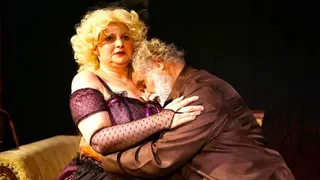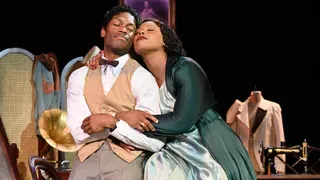December 6, 2007
Panopoly
Michael Wood READ TIME: 2 MIN.
In his world premiere Panoply , presented by 11:11 Theater Company at Boston Playwrights Theater through Dec. 8 (www.1111theatre.com,) local writer Brian Tuttle schools us on the wicked, wicked, ways of the world. Weaving a broad tapestry of characters that stretches from Dorchester to Egypt, Panoply reveals the unexpected connections between people all over the world, especially how the sins of one can come home to roost with ugly collateral damage for others. It's a very ambitious play, but I was left with the feeling that the company hadn't done its homework.
The sense that Tuttle has bitten off more than he can chew dawns before the action begins on Kadi Dooley's efficient though overly literal set that's dominated by huge maps. Perusing the program I found a director's note explaining a vague "growing sense" that the world is "growing up," just like the 20-somethings of the company are growing up. Projecting your own political awakening onto the entire world is an odd bit of arrogance to be paired with a play that portrays Americans' willful ignorance of foreign countries and the consequences of bullying foreign policy. But which part is ironic? The program goes on to helpfully inform us that Paris is a capital of fashion and culture, and Tangiers has many "ethnicities" like Christians and Muslims.
Tuttle has created an ingenious matrix of plotlines about various travelers in Europe and Morocco, and he creates interesting intersections between the characters that are logical and satisfying once you grant the "six degrees of separation" motif. And he has a cinematic sensibility that's interesting to see on the stage - his short scenes, parallel events and wordless montages are clearly influenced by the likes of Paul Haggis and P.T. Anderson. But Panoply is plagued with vagueness, as if Tuttle thought he was done when he plotted it all out. Characters are so thinly sketched that at times they seem completely devoid of motivation, and some of the situations are too simplistic, their resolutions too pat. A top-notch cast could probably make more of these scenes work, but most of the actors are out of their depth. Katarina Abri is affecting as an emotionally wounded woman driven to a desperate act, and Danhai Jackson at least seems like a real person. Otherwise the performances are, like the script, either too underplayed or too overwrought. Panoply might be a great play (or better yet, movie) someday, but it hasn't arrived yet.
Michael Wood is a contributor and Editorial Assistant for EDGE Publications.







